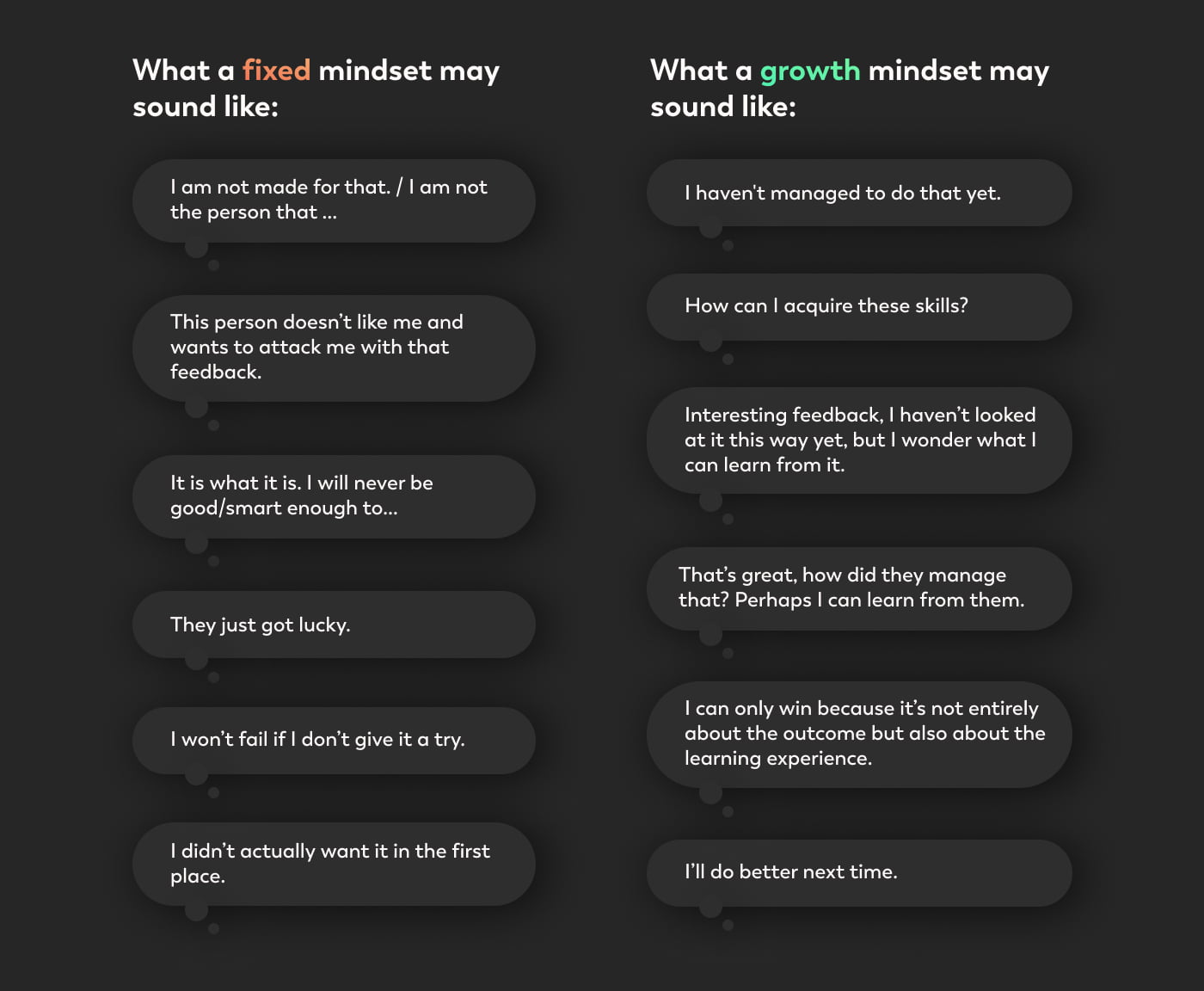A psychology geek’s take on the growth mindset and why it matters for flow
Download Flow Lab
Flow Lab is your AI-powered mental fitness app that helps you experience the highly productive Flow State more often. So get your 7-day free trial and train your mind with science-backed guided and personalized meditations: ![]()
![]()
This article was written by Flow Lab’s Head of Content and MSc. psychologist Eva Siem. She studied at the University of Groningen (NL) and is specialized in the area of performance and motivational psychology. In her articles, she combines findings from psychological research with practical tips from her experience as mental fitness coach and workshop trainer.
Remember that basketball player who missed over 9000 shots, lost close to 300 games and missed the game-winning shot 26 times over the course of his career? You sure do because he was no less than perhaps the greatest basketball player in sport’s history – Michael Jordan. He said: “I’ve failed over and over and over again in my life. And that is why I succeed” (Goldman & Papson, 1998, p. 49).
How come that some people don’t let themselves be discouraged by setbacks, always strive to improve themselves, and are motivated to learn and keep going while others interpret failure as indication for incompetence and remain below their capabilities because they don’t even try in the first place? It all comes down to the mindset we have endorsed. Our mindset influences a great deal of our everyday experiences, how much effort we put into achieving a goal, our self-esteem and also our Flow experiences. Stay tuned to learn more about the growth mindset and flow and how to enhance both.

As fixed as intelligence (i.e., not at all) – the role of mindsets
The fixed mindset
The psychologist Carol Dweck was the first one to define two types of mindsets: the fixed and the growth mindset (Dweck, 1999). These mindsets are based on the beliefs about the fixedness or changeability of personal qualities and create meaning systems people use to interpret and act in their everyday lives. People with a fixed mindset, also referred to as entity theorists, believe that their personal qualities are inborn and stable. This implies that they believe setbacks to be indicative of their inadequacy and are therefore also more vulnerable to criticism. Implicitly believing that they won’t be able to change anything about it makes them take negative feedback at face value without trying to extract any information on how to improve (Ehrlinger et al., 2016; Murphy & Dweck, 2016). Instead, they will more likely become defensive, blame external factors for their setback, or shrug off their failures.
The growth mindset
On the other side of the spectrum, people with a growth mindset, or incremental theorists, believe that personal qualities result from hard work and effort. They see setbacks as an opportunity to learn. And don’t take criticism personally, but rather reflect on it with curiosity. Studies show that growth mindsetters¹ may actually have a point: Apparently, many abilities can indeed be acquired through practice (see Brown, 1997; Diamond & Lee, 2011; Ericsson et al., 1993; Sternberg, 1985). Take it from Alfred Binet who invented the intelligence test. He agrees:
“A few modern philosophers […] assert that an individual’s intelligence is a fixed quantity which cannot be increased. We must protest and react against this brutal pessimism […]. With practice, training, and above all method, we manage to increase our attention, our memory, our judgment, and literally to become more intelligent than we were before.” (Binet, 1909/1973, pp. 105–106).
Different mindsets for different qualities
It seems that both mindsets are equally popular: Researchers assume around 40% of people to endorse a fixed mindset, about 40% to endorse a growth mindset, and about 20% to be undecided (Spinath et al., 2003). But it’s not as black and white: We can adopt different mindsets for different qualities (Dweck et al., 1995). We may think we’re generally bad with directions (fixed mindset), yet believe in our ability to improve our dribbling skills on the basketball court (growth mindset). Realizing which mindset is prominent in a given situation can be tough at times because their manifestations and corresponding thoughts may be more subtle. If you think of a challenge you are currently facing, which statements best reflect the thoughts that cross your mind?

Flow is a matter of mindset
There is quite some overlap between the growth mindset and the components of and conditions for flow. So let’s dive a little deeper into what psychological research revealed about their relationship and how you can benefit from developing a growth mindset.
A growth mindset and flow require…
… challenging mastery goals
Fixed mindsetters are more likely to aim for what psychologists call “performance goals”: They are more focused on validating their competence or avoiding to appear incompetent. On the flipside, growth mindsetters have been found to set so-called “mastery goals” that are oriented towards learning experiences and developing competence. Butler (1995) explored how different goals affect the information children seek. After a divergent thinking task, children were free to look at three different tables: a “Creative Ideas” table (with pictures of other children as a source of inspiration for how to improve themselves), a “Creative Ability” table (showing information about the quality of their own work and how well they did compared to others) and a table with magazines for them to read (as informational alternative). Results showed that children with goals focused on learning experiences spent more time at the “Creative Ideas” table. This suggests that they were more interested in improving their skills rather than evaluating how they performed compared to others or avoiding feedback altogether.
Mastery goals are also linked to more flow experiences (Weintraub et al., 2021). One explanation may be that, in order to develop themselves further, people with a growth mindset are also more likely to set more challenging goals that really stretch their skills. Flow, in turn, is more likely to arise as this unique peak experience of deep focus and motivation involves a growth principle. That is, people need to seek increasingly complex challenges and step out of their comfort zone (Csikszentmihalyi et al., 2005). Put in numbers, the 4%-rule explains that the demands of a task need to be perceived around 4 percent higher than an individual’s perceived skills. In other words, a task needs to appear challenging, yet doable – something a person with a growth mindset is more likely to actively pursue. Psychologists also explain that mastery goals foster intrinsic motivation (Heyman & Dweck, 1992), another key to getting into the zone!
People with a growth mindset have been found to set so-called “mastery goals” that are oriented towards learning experiences and developing rather than validating competence.
… openness for feedback and a learning-from-error approach
Every challenging long-term goal will sooner or later put your abilities and also your resolve to the test. People with different mindsets also differ in how they cope with obstacles and setbacks. In general, fixed mindsetters tend to throw in the towel when it gets uncomfortable, avoid feedback so they can protect their self-esteem, and blame mistakes or failures to external causes. Perhaps they failed the exam because of construction work outside, the teacher whose grading or exam questions were unfair, or the roomie who convinced them to stay up late the night before the exam.
Growth mindsetters are said to be more resilient. They see setbacks and criticism as part of learning and growth and rather look for ways to overcome these hurdles and improve their weaknesses. Studies show that organizations that promote a learning-from-error climate and use mistakes as direction for improvement not only promote the growth mindset in their workers, but also facilitate their flow experiences (Caniëls et al., 2021). Knowing that they won’t be punished in case something doesn’t go according to plan makes employees persist even in the face of obstacles – a skill that is central to people who frequently find flow (so-called “autotelic” individuals).
Rather than throwing in the towel, people with a growth mindset see setbacks and criticism as part of learning and growth. They look for ways to overcome these hurdles and improve their weaknesses.
… that we stop lying to ourselves and look for excuses
We do a lot to maintain a positive view of ourselves. In fact, there are theories on a “psychological immune system” that engages biased behaviors, perceptions, and cognitions whenever our self-esteem gets threatened (Gilbert et al., 1998). This may explain why people with a fixed mindset fall back to certain strategies that, in the psychological realm, are called self-handicapping and self-enhancement. Self-handicapping is the intentional sabotage of one’s performance in order to have an excuse of why something didn’t work out. It may sound counterintuitive at first, but take, for example, procrastination. You may have heard that procrastination doesn’t necessarily have to be a matter of bad time management. In fact, it may rather be related to anxiety and fear of failure. If you are afraid to fail, handicapping yourself by putting off your tasks may be more comfortable (at least in the short-term) because if you do fail, you can attribute it to a lack of time rather than ability.
Fixed mindsetters may also slip into self-enhancement strategies. They consist of self-evaluations aiming at maintaining a positive self-view. Remember the tendency to blame failure to external causes? That’s a classic example of self-enhancement. It may also express itself in social comparisons: When you think of successful people who may be a few steps ahead of you, which thoughts usually cross your mind? Do you notice a feeling of jealousy or think they just got lucky? With a fixed mindset, it is easy to get stuck in envy when comparing with more successful people (upward comparison) and to feel better when comparing to those who are worse off (downward comparison).
Self-handicapping is the intentional sabotage of one’s performance in order to have an excuse of why something didn’t work out. Click To Tweet
You probably guessed it: People with a growth mindset don’t need these kinds of self-esteem protection strategies. They rather get inspired by people who seem superior and reflect whether they can learn a thing or two from them. They believe in their ability to achieve their goals (high self-efficacy beliefs) and to control a certain outcome (internal locus of control) rather than letting it be determined by fate or luck. And they will be rewarded: Believing in your success and in your ability to control a certain outcome, which also makes you set more ambitious goals, has been found to increase flow (e.g., Mikicin, 2007; Mosing et al., 2012; Taylor et al., 2006). During flow, peak performance is possible which makes mastery experiences more likely and increases self-efficacy beliefs again. This means, an upward spiral between self-efficacy and flow is triggered (Salanova et al., 2006).
Fun Fact: A growth mindset can also reduce stereotypes
A growth mindset also helps to reduce stereotypes. Good and colleagues (2012) conducted a study on females’ sense of belonging and performance in a maths class. They found a gender gap with regard to maths achievement and, more specifically, that a low sense of belonging among females also led to lower final grades. But that’s not all: A growth mindset culture in class helped to significantly reduce this gap! Even when facing negative stereotyping, females didn’t feel as if they would not belong there and remained confident in their abilities.

How to train a growth mindset and find more flow
Luckily, research shows that we can learn to adopt a certain mindset (e.g., Miele & Molden, 2010; Niiya et al., 2004; Nussbaum & Dweck, 2008). Buckle up for a few tips on how to develop a growth mindset and find more flow:
Tip #1: It’s not the Now that matters, it’s the Yet.
Become aware of the language you’re using. Rather than overgeneralizing (“I will never manage to do that”) or giving up (“I haven’t managed to do that.”), use the power of yet (“I haven’t managed to do that yet.”). This small change in phrasing can have a big impact because it already implies that this isn’t the ending and you are still on your journey. It takes off the pressure and can help you to let go of perfectionism or fear of making mistakes.
Tip #2: Deconstruct a skill you have learned in the past.
A great way to adopt a growth mindset and find more flow for future challenges is by deconstructing how you learned a skill in the past that you are mastering today. Reflect on different phases during the process – from not managing it at all, over the moment you first recognized an improvement, the challenges you overcame, the small steps you took to make continuous progress, the learnings you had, until you finally mastered it. Recalling that you have already improved a certain skill in the past can help build confidence for acquiring new skills in the future as well.
Tip #3: Prepare yourself for mastery.
In our everyday lives and also at work, a lot is focused on results. But as you know by now, focusing on the learnings you may have during the process amps up your motivation and also helps you experience more flow. So whenever you’re setting a goal – be it to finish that case study for work by the end of the week, to read 10 pages before going to bed, or to order less takeaways – also set a goal for the things you would like to learn during the process – learning something you didn’t know yet about a certain topic, optimizing your movements when chopping the vegetables, or perhaps learning something about yourself. This way you’ll make sure that the journey is more enjoyable and worth it for its own sake – no matter if you achieve the desired outcome or not.
Tip #4: Find role models.
Become inspired by people who are ahead of you on your path. Remain curious and do some research on how they got there. You may do an internet search or, if possible, even directly reach out to them (and you’ll probably see that many people are happy to help because, let’s be real, everyone likes being complimented for one’s successes, don’t they?). Become aware of the fact that they also put quite some effort into their accomplishments and reflect on the strategies you may want to adopt yourself.
Tip #5: Train your mind
Developing a growth mindset doesn’t happen overnight. It requires regular mental training – and we are here to help you out. Many sessions in the training area of “Drive” aim at fostering a growth mindset. Check out, for instance, “Bounce Back” that uses CBT techniques to reframe a setback, or the guided reflection “Never Not Growing” to become aware of how you would like to develop yourself further.
Extra tip: Promote a growth mindset in others by praising the effort.
Studies in the educational context have found that praising students for their intelligence promoted a fixed mindset, whereas praising them for their effort promoted a growth mindset. So if you compliment others for a success, make sure you exchange statements such as “You are so smart/talented that you mastered this challenge” with “You must have worked so hard and it’s amazing to see how you have grown!”
Start your journey now with the help of your digital mental coach. Train to develop a growth mindset, continuously expand your comfort zone, and find your Flow!
—
¹ Whenever using the expression “mindsetters” in this article, we don’t refer to certain personality traits, but rather people who adopt this mindset in a certain situation.
